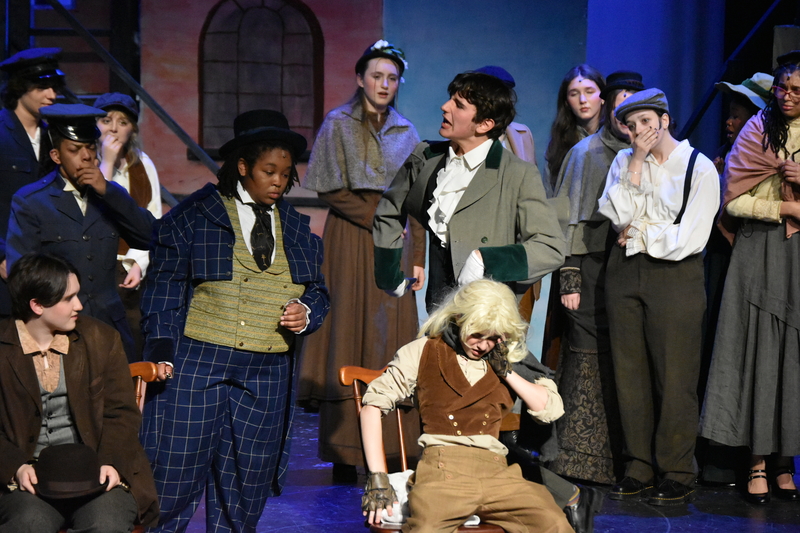
Thursday, Oct. 17 was the opening night of Dogface, and, despite showing on a weeknight, the theatre was packed. The audience quieted down as the house lights dimmed and the play finally began. The opening scene of the show is bizarre, with our main character, Dogface, offering only a profile view against the harshly-lit red background. Dogface briefly introduces the scene to come, and then we are given a full view of her appearance. Her face is frighteningly scarred down her right side, and so the story begins with Dogface’s narration.
Dogface, written by Kellie Powell, is a beautifully worded play about growing up as an ugly child. The title character, Dogface, is given the derogatory nickname by her fellow schoolmates after an attack by a dog leaves her face covered in scars. As a result of traumatic bullying, her scars become emotional as well as physical. Senior Eliza Renner, who was cast as Dogface, somehow managed to portray her character at ages 7, 11, 15, 19, and 23 years old, in chronological order—meanwhile, alternating between narrating and reliving key moments in Dogface’s life.
Dogface was, from the beginning to the end of the show, an absolutely captivating sequence of scenes. This show, in my opinion, was one of the strongest theatrical productions I’ve attended at Grady. Renner and the rest of the cast portrayed the characters in such a down-to-earth manner that the audience—myself included—both laughed and cried. Dogface has definitely raised the bar for upcoming theatre productions, despite its simple set pieces and lighting effects. In fact, the minimalist appeal of the set designs enabled the show to flow more easily in between scenes; a short scene change is best for both audiences and backstage crews.
One of the most moving moments in the brief one-act play takes place when Dogface is 23 years old. In the scene, Dogface and her best friend Ethan, played by senior Preston Choi, discuss a one-night stand between the two that happened weeks earlier. At this age, it’s obvious to the audience that Dogface has been heavily misshapen by bullying and insecurity her whole life. Ethan, despite the awkward atmosphere that was borne out of past passions, reassures Dogface that she has much to offer in life, though they both seem to acknowledge that they will never be in a romantic relationship with one another. The bittersweet scene ends with Dogface telling the audience that her life doesn’t improve with a glorious happy ending, and the curtains close.
The reason this play was such an incredible production is that the characters were so real. Dogface’s transformation from a scarred girl to an insecure woman splendidly illustrates the painful reality of growing up ugly. Although the audience can easily see the inner beauty of Dogface, none of the characters are able to see anything other than the scars on her face—which, though shameful, is realistic to expect of human shallowness. Dogface audiences are able to reflect on their experiences as maturing adults, whether they are maturing adults themselves or those well into adulthood. Dogface was a perfect choice for the Grady drama department, and it was well worth the mere $10 spent.
On Saturday, Oct. 26, the cast of Dogface competed in the 6-AAAA region One-Act competition and won first place. Renner and Choi also took home the titles of Best Actress and Best Actor. Because the show did so well at the regional one-act competition, the actors will compete in the state one-act competition at Warner Robins High School on Saturday, Nov. 9. After seeing Dogface, I would say that there is much to look forward to throughout the remainder of the Grady drama season.












